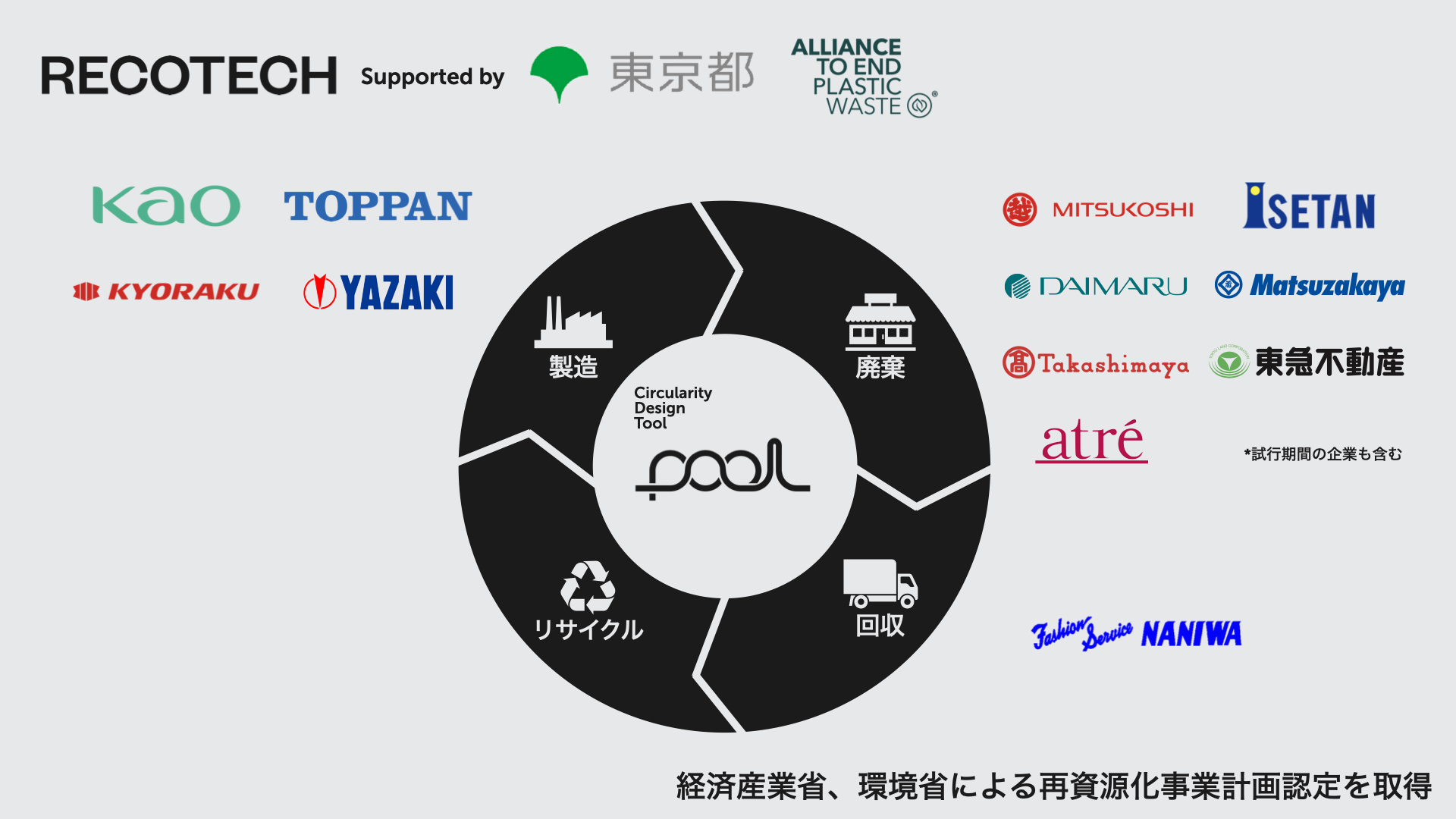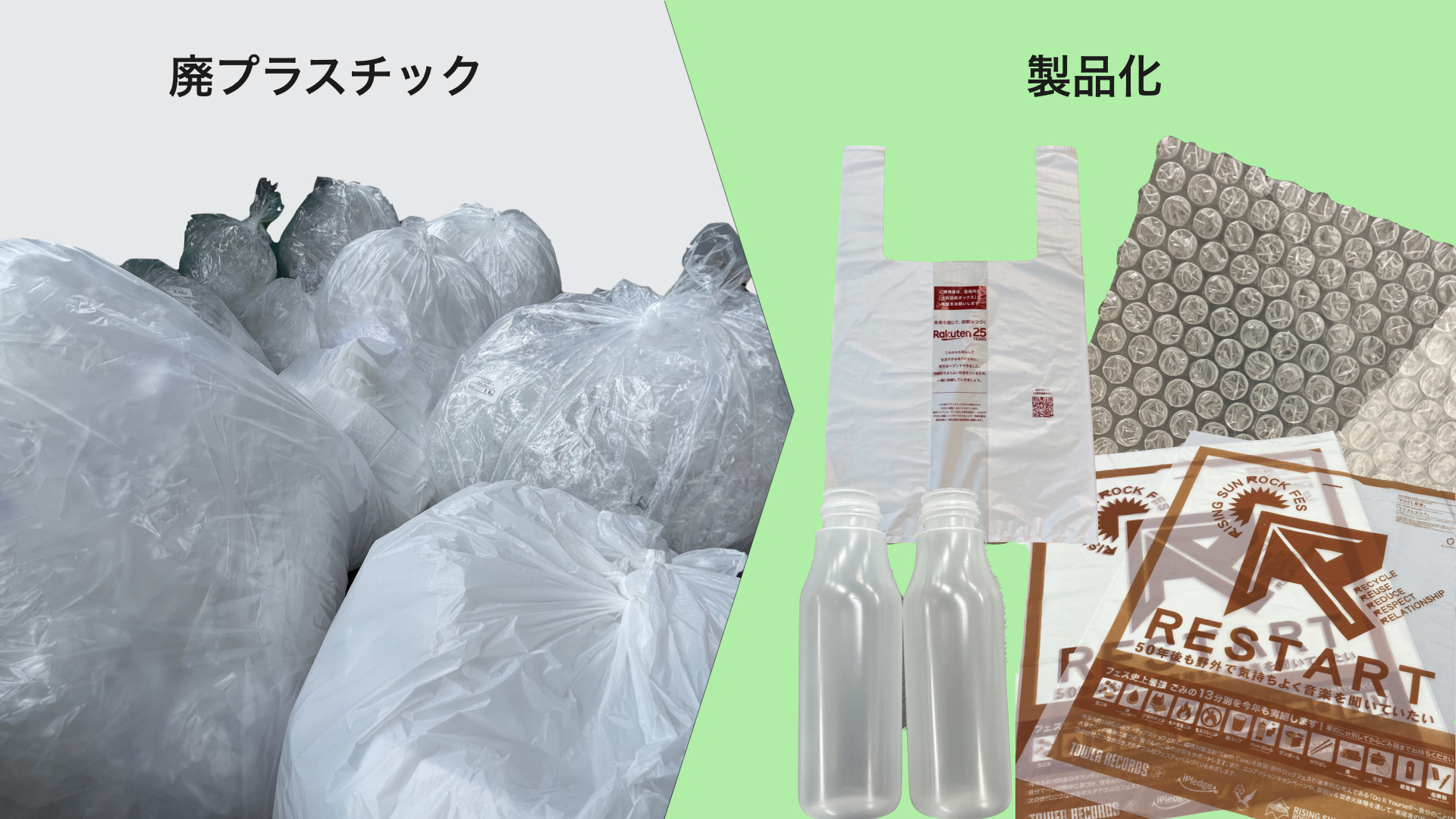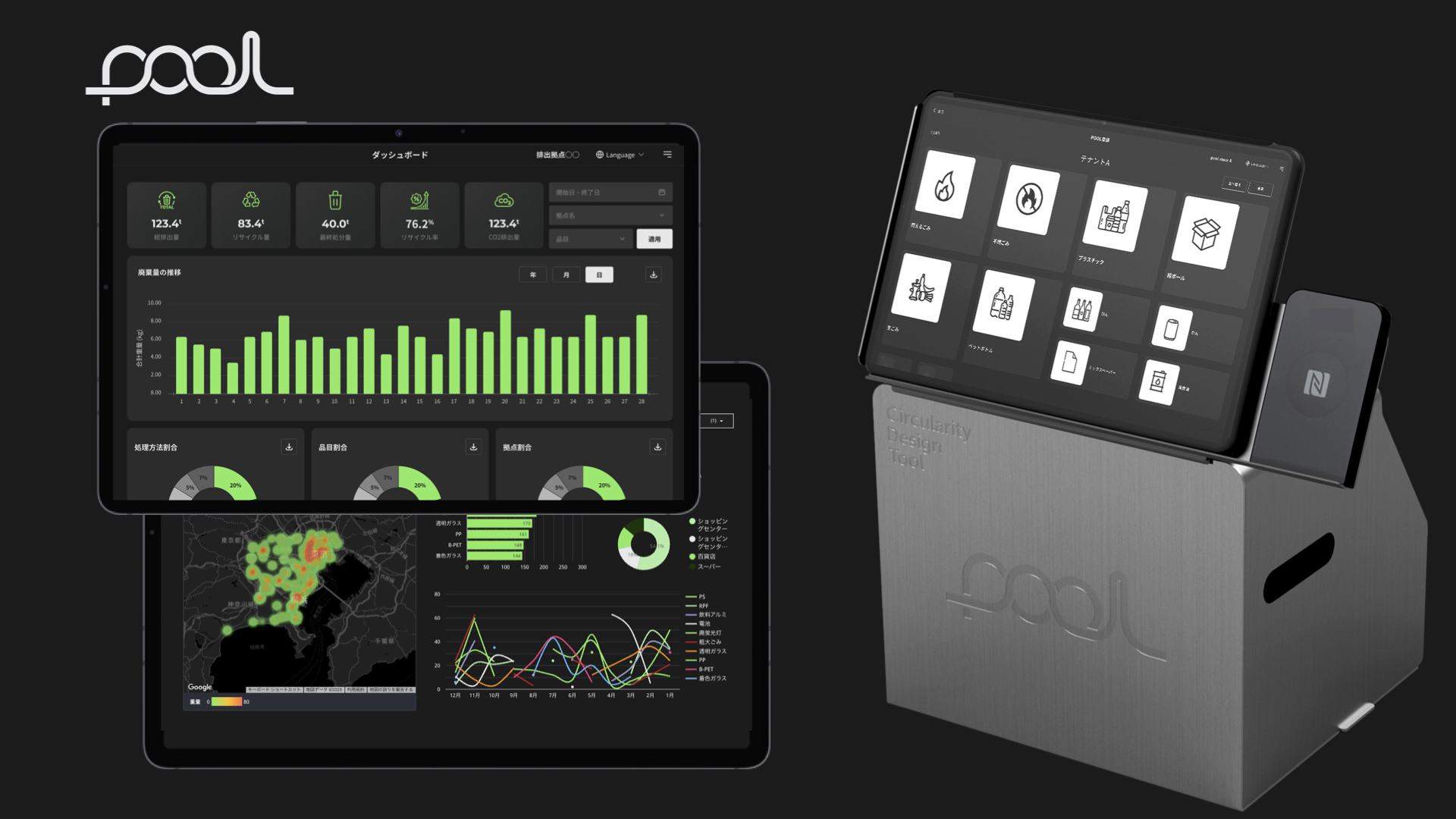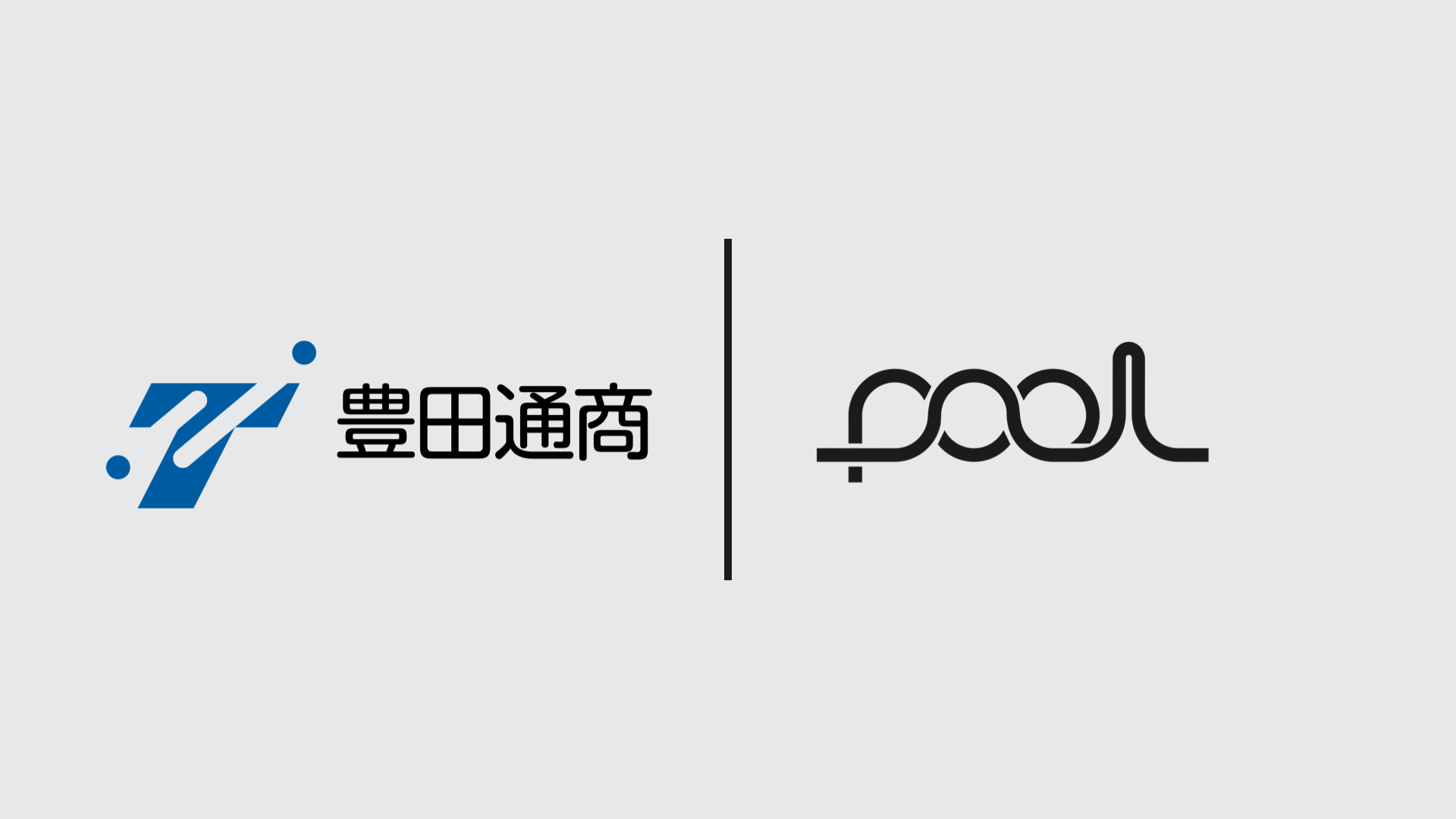Expanding the Circular Plastic Resource Business “pool” Throughout the Kanto Region, Leveraging Ministerial Certification Under the New Plastic Law. Scaling a Sustainable Resource Circulation Business by Establishing a Circular Supply Chain Originated from Discarded Plastic, Supplying PCR Materials with Traceability.

Recotech Co., Ltd. (hereinafter referred to as “Recotech”), is pleased to announce that its project “Construction of an Digital Platform for Recycling Plastics (hereinafter referred to as the “pool project”),” which has been collaborating with the Tokyo Metropolitan Government as part of the “Innovative Technology and Business Model Promotion Project for Plastic Resource Circulation,” has been selected for the further category, “Implementation and Business Start-Up Support Project.” Through this initiative, Recotech aims to scale up and implement a sustainable plastic resource circulation business model using the pool platform, contributing to both environmental and economic aspects.
Background
In recent times, urgent global concerns such as the climate crisis and ocean plastic issues have made decarbonization and the realization of a circular economy imperative. Concrete legislative measures, particularly in reducing plastic waste and mandating the use of recycled materials have been advancing, mainly in Europe and the United States. In Japan, the Plastic Resource Circulation Promotion Act (hereinafter referred to as the “New Plastic Law”) was enacted in 2022, promoting legal measures to encourage the recycling of plastic in municipalities and businesses.
In December 2019, the Tokyo Metropolitan Government formulated and disclosed the “Zero Emission Tokyo Strategy” to contribute to achieving near-zero global CO2 emissions by 2050. Within this strategy, efforts have been directed towards substantial reduction and reuse of disposable plastics, as well as implementing horizontal recycling to return plastics to the equivalent to virgin resin. To promote these initiatives, a collaborative project has been undertaken by businesses aiming for the social implementation of innovative technologies and business models from the fiscal year of 2022. Recotech was selected for the “Investigation and Analysis Project” and the “Verification Project” respectively in the fiscal year 2022 and has been consistently enhancing the pool project.
About pool project
“pool” is a tool designed to build an infrastructure for collecting waste efficiently by digitizing “waste” data, connecting manufacturers who want to incorporate recycled materials into their products with dischargers that can supply that material. Recotech perceives various “waste” as “urban resources” and aims to create a circular supply chain ensuring traceability of their circular materials, using “pool.”
The initial focus was on soft plastics generated in large quantities from commercial facilities and clothing stores. With minimal risk of other materials mixing in and the fact that they are monomaterial, Recotech was able to establish a system that supplies the recycled plastics to manufactures with high demand for PCR materials. By registering information in the pool system, stakeholders in emission, collection, intermediate processing, recycling, and procurement can manage information on quality, cost, volume, and traceability while circulating PCR materials throughout the entire supply chain.
In response to obtaining ministerial certification under the New Plastic Law, the project plans to expand collection in the Kanto and Kyushu regions within the year and expand nationwide, focusing on major cities, including the Kansai region, by 2024.
*Post-Consumer Resin (PCR): Material generated from products that have reached the end of their life cycle as a consumer item and are recycled into new products.
Benefits for Participating Companies
[For Dischargers]
・Realization of sustainable mechanical recycling.
・Calculation and reduction of Scope 3 Category 5 CO2 emissions.
・Reduction of disposal cost.[For Manufacturers]
・Procurement of high-quality and traceable PCR materials.
・Reduction of Scope 3 Category 1 CO2 emissions.Key Focus Areas for the Current Fiscal Year
[Creating a Database Platform for Waste and Circularity]
・Collaborate with end-user companies (i.e. manufacturers) to define software requirements for managing quality, volume, cost, traceability and environment impact for continuously procuring PCR materials.
・Update functions of current stakeholders in the supply chain according to actual operations and needs.[Stabilizing Quality of PCR Resin]
・Standardize and manage the quality sorting when discharged using pool.
・Sorting awareness campaigns and regular feedback on sorting quality to minimize contamination.
・Verify methods for removing contamination, improving quality in the recycling process, finding optimal solutions with economic viability.
[Optimizing Cost]
・Expand the collection network to the entire Kanto region using the certification under the Plastic New Law.
・Optimize operations throughout the supply chain; collection, processing, transportation/storage, and recycling through scaling, minimizing aggregate logistics costs.Future Prospects
In this fiscal year, the goal is to significantly expand collection from commercial facilities and clothing stores in the Tokyo metropolitan area (Tokyo and the three neighboring prefectures: Kanagawa, Chiba, and Saitama). Simultaneously, accelerating the incorporation of PCR materials to plastic products, Establishing a sustainable circular business model.
About RECOTECH
Recotech is a Climate Tech Startup with a mission to “take responsibility for today’s problems, and build a sustainable legacy.” The current waste management system primarily involves incineration or landfill, leaving a burden for the next generation. Recotech aims to transform this structure through technology and to build a nature-positive economy.
About Circularity Design Tool – pool
“pool” is a cloud service that transforms the end of resource value into a beginning. By digitizing urban resources, “pool” enhances collection efficiency, connects manufacturing companies that want to incorporate recycled materials into their products with dischargers, and enables us to design a circular supply chain. From waste to material, “pool” can prove and provide information on traceability and CO2 impact (scope3, category1&5) on every process throughout the supply chain, with each stakeholder simply inputting data with their smartphone or tablet.










